Advanced Spanish Step-by-Step: Master Accelerated Grammar to Take Your Spanish to the Next Level (2012)
Part III. Future and Conditional Tenses; Past Subjunctive; Idioms
Chapter 14. The Past Perfect Subjunctive
The past perfect subjunctive, also called the pluperfect subjunctive, is often translated the same as the indicative past perfect tense in English, for example, I had eaten. Like all subjunctives, this form must be caused by a verb or expression that causes the use of the subjunctive mood in the dependent clause.
Formation of the Past Perfect Subjunctive
The past perfect subjunctive is a compound verb form. To form the past perfect subjunctive, use the imperfect subjunctive of the helping verb haber and follow it with the past participle of the main verb.
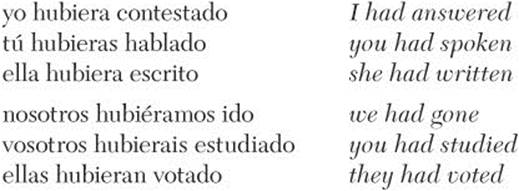
Uses of the Past Perfect Subjunctive
The past perfect subjunctive expresses action that happened before another action occurred. As you know, the subjunctive mood cannot exist alone. An element in the main clause causes the subjunctive in the dependent clause.
After Certain Verbs
Certain verbs cause the subjunctive in a dependent clause. If the verb in the main clause is in the past (imperfect or preterit), these verbs can cause the past perfect subjunctive in the dependent clause.
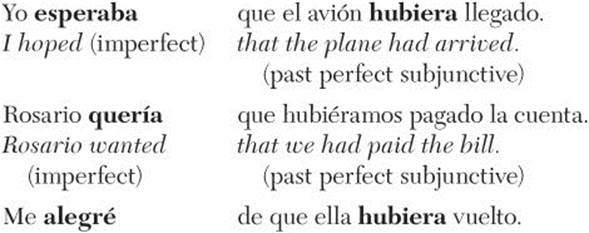
I was glad (preterit) that she had returned. (past perfect subjunctive)
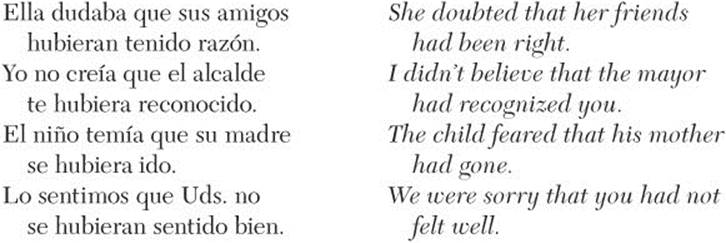
After Certain Impersonal Expressions
Certain impersonal expressions in the main clause cause the subjunctive in a dependent clause. If these expressions are in the past, they can cause the past perfect subjunctive in the dependent clause.

• After ojalá
The past perfect subjunctive is used to express a contrary-to-fact wish in the past with ojalá.
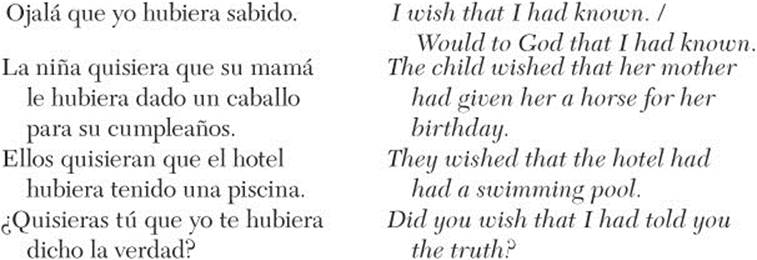

• quisiera
The use of the imperfect subjunctive of querer, most often quisiera, in the main clause can cause the past perfect subjunctive in the dependent clause.

![]() Exercise 14.1
Exercise 14.1
Complete the following sentences with the correct past perfect subjunctive form of the verb in parentheses. In these sentences, the main clause is in the imperfect or preterit. Note the element that causes the use of this mood.
![]()
1. Jorge no estaba seguro que nosotros_________________________la cuenta. (pagar)
2. Ella esperaba que nosotros_________________________una cita con su hija. (hacer)
3. Yo no podía creer que mi amigo_________________________tal cosa. (decir)
4. No había nadie en la fiesta que_________________________por todo el mundo. (viajar)
5. La princesa nunca creía que su príncipe_________________________. (venir)
6. Deseábamos que no_________________________tanto. (llover)
7. Elena se alegró mucho de que Uds._________________________. (mejorarse)
8. Sus parientes sintieron mucho que Irene y Gustavo no_________________________. (casarse)
9. Roberto dudaba que nosotros_________________________todo el dinero. (gastar)
10. Yo no pensaba que las flores_________________________. (vivir)
![]() Exercise 14.2
Exercise 14.2
Translate the following sentences into English.
1. Ojalá que no se lo hubiéramos dicho.
__________________________________________________
2. Ojalá que Uds. hubieran estado bien.
__________________________________________________
3. Ojalá que hubiéramos ido de vacaciones.
__________________________________________________
4. Fue necesario que el carpintero lo hubiera construido.
__________________________________________________
5. Fue urgente que nosotros hubiéramos llevado al hombre enfermo al hospital.
__________________________________________________
6. Era una lástima que nadie hubiera estado en el teatro.
__________________________________________________
7. Esperábamos que todo el mundo se hubiera aprovechado de la situación.
__________________________________________________
8. Los porteros dudaban que los inquilinos nuevos hubieran pintado las paredes.
__________________________________________________
9. El abogado no pensaba que sus clientes hubieran ganado.
__________________________________________________
10. Fue posible que los ladrones hubieran robado el banco.
__________________________________________________
The Contrary-to-Fact Conditional si-clause in the Past
When you express the idea that an action would have happened (conditional perfect tense) if another action had occurred in the past, the past perfect subjunctive follows the clause that begins with si.
Review the conditional perfect tense:

The si-clause expresses the idea that something would have happened if something else had happened. Remember that the subjunctive form follows si.
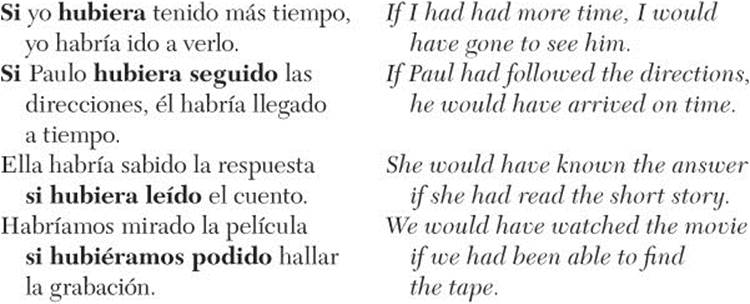
![]() A Word About the si-clause
A Word About the si-clause
In everyday speech, the perfect conditional (for example, habría hecho) is sometimes replaced by the past perfect subjunctive (hubiera hecho). In these sentences, when a si-clause is present, both clauses will contain the same tense—the past perfect subjunctive.
Compare the following sentences to the ones you have just studied. Note that the English translations are the same. Both forms are correct.
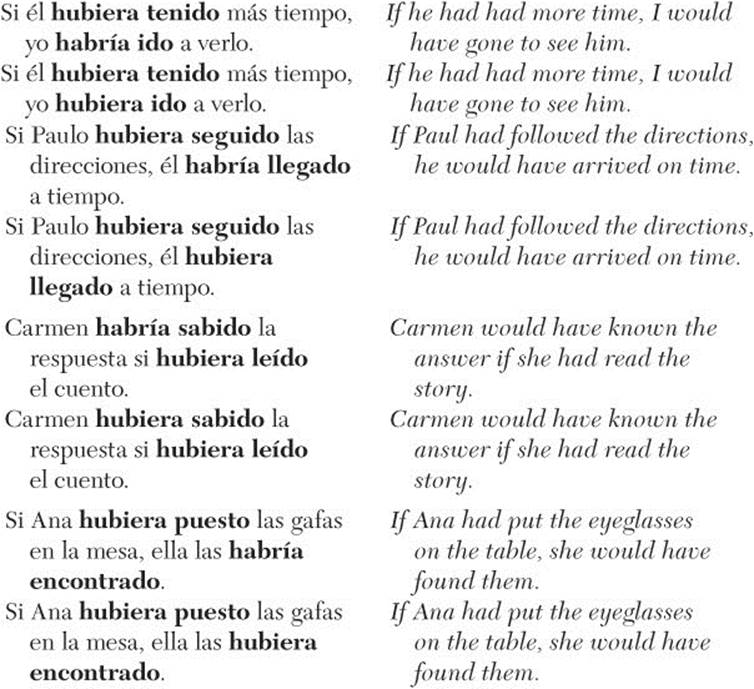
![]() Exercise 14.3
Exercise 14.3
Review the conditional perfect tense, then translate the following sentences into Spanish. Remember that object pronouns are placed directly before the verb form and are never attached to the past participle.
EXAMPLE We would have eaten. Habríamos comido.
1. I would have gone._________________________
2. You would have eaten._________________________
3. We would have laughed._________________________
4. They would have told you._________________________
5. The teachers would have taught._________________________
6. Marisa would have been happy._________________________
7. Hillary would have been president._________________________
8. It would have been possible._________________________
9. The women would have learned it._________________________
10. The men would have left._________________________
![]() Exercise 14.4
Exercise 14.4
Translate the following sentences into Spanish. These sentences include a contrary-to-fact si -clause.
![]()
Habríamos comido en el restaurante si hubiéramos ido allá antes.
1. I would have gone to the party if I had not been afraid.
__________________________________________________
2. You (Ud.) would have eaten the fish if we had cooked it at home.
__________________________________________________
3. We would have laughed if the movie had been funny.
__________________________________________________
4. They would have told you the truth if you (tú) had wanted to know it.
__________________________________________________
5. The teachers would have taught if the students had arrived.
__________________________________________________
6. Marisa would have been happy if she had known how to skate.
__________________________________________________
7. Hillary would have been president if more people had voted for her.
__________________________________________________
8. It would have been possible that they had seen me.
__________________________________________________
9. The women would have learned it if they had bought the book.
__________________________________________________
10. The men would have left the house if they had had somewhere to go.
__________________________________________________
Reference Chart:
Sequence of Tenses with the Subjunctive Mood
If the verb in the main clause is in the present or future, the verb in the dependent clause can be in the present subjunctive.

If the verb in the main clause is in the present or future, the verb in the dependent clause can be in the present perfect subjunctive, depending on the meaning you want to express.

If the verb in the main clause is in the past (imperfect or preterit) or conditional, the verb in the dependent clause can be in the imperfect subjunctive.

If the verb in the main clause is in the past (imperfect or preterit) or conditional, the verb in the dependent clause can be in the past perfect subjunctive.
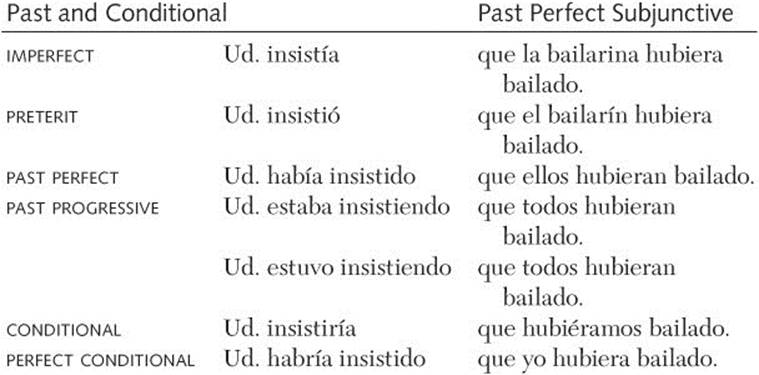
![]() Exercise 14.5
Exercise 14.5
Complete the following sentences with the correct present subjunctive form of the verb in parentheses. The verb in the main clause is in the present tense.
EXAMPLE Te digo que te cuides. (cuidarse)
1. Espero que Uds._________________________bien. (estar)
2. Nos alegramos mucho de que el hombre_________________________en el maratón. (correr)
3. El cocinero espera que te_________________________su comida. (gustar)
4. Te digo que no_________________________. (quejarse)
5. Es imposible que nosotros_________________________todo. (saber)
6. Dudamos que los inquilinos le_________________________al dueño. (ganar)
7. Ojalá que los huéspedes_________________________. (venir)
8. ¿Hay alguien aquí que_________________________cien dólares? (tener)
9. Espero que Uds._________________________bien. (sentirse)
10. La pareja sugiere que los invitados_________________________bien. (vestirse)
![]() Exercise 14.6
Exercise 14.6
Complete the following sentences with the correct present subjunctive form of the verb in parentheses. The verb in the main clause is in the imperative.
1. Dile al niño que_________________________. (acostarse)
2. Dígale al taxista que nos_________________________a nuestro destino. (llevar)
3. Pídele al hombre malo que_________________________. (irse)
4. Aconséjenles a los acusados que_________________________un buen abogado. (conseguir)
5. Deja que ellos_________________________. (entrar)
6. No permitas que los niños_________________________. (caerse)
![]() Exercise 14.7
Exercise 14.7
Complete the following sentences with the correct present subjunctive form of the verb in parentheses. The verb in the main clause is in the simple future or future periphrastic (ir + a + infinitive).
1. ¿Será imposible que los adolescentes_________________________a sus padres? (escuchar)
2. Susana no irá a menos que su mejor amigo_________________________. (ir)
3. Voy a pedir que la gente no_________________________más. (fumar)
4. Margarita insistirá que su compañero_________________________el oficio de la casa. (hacer)
5. El juego no se acabará hasta que la mujer gorda_________________________. (cantar)
![]() Exercise 14.8
Exercise 14.8
Complete the following sentences with the correct present subjunctive form of the verb in parentheses. The verb in the main clause is in the present perfect.
1. Yo he querido que Uds._________________________a mi novio. (conocer)
2. ¿Has deseado que tu familia_________________________viajar contigo? (poder)
3. Le hemos dicho a la juventud que_________________________ocho horas cada noche. (dormir)
4. Juana les ha sugerido a sus padres que no _________________________tanto. (trabajar)
5. Las dos familias han esperado siempre que sus hijos_________________________felices. (ser)
6. ¿Quién se ha alegrado de que sus enemigos_________________________éxito? (tener)
7. Ha sido difícil que la gente_________________________construir una casa nueva. (lograr)
8. Ha sido bueno que nosotros_________________________todo. (aprender)
![]() Exercise 14.9
Exercise 14.9
Complete the following sentences with the correct imperfect subjunctive form of the verb in parentheses. The verb in the main clause is in the preterit.
1. Fue necesario que los bomberos_________________________en la casa quemada. (entrar)
2. El soldado dudó que_________________________mucho peligro. (haber)
3. Mandé que el camarero me_________________________la cuenta. (traer)
4. Ella salió sin que nosotros_________________________. (fijarse)
5. Yo te rogué que_________________________a mi lado. (sentarse)
6. El dueño mandó que nosotros_________________________del edificio en seguida. (salir)
![]() Exercise 14.10
Exercise 14.10
Complete the following sentences with the correct imperfect subjunctive form of the verb in parentheses. The verb in the main clause is in the imperfect.
1. Julia esperaba que su amigo_________________________. (mejorarse)
2. Ellos temían que Ud. no_________________________. (regresar)
3. Los profesores se alegraban de que a sus alumnos les_________________________su clase. (encantar)
4. Estábamos contentos de que Miguel le el_________________________anillo. (dar)
5. José lo sentía que nosotros no_________________________. (animarse)
6. Yo no creía que tú me_________________________. (ver)
![]() Exercise 14.11
Exercise 14.11
Complete the following sentences with the correct imperfect subjunctive form of the verb in parentheses. The verb in the main clause is in the conditional.
1. ¿Sería posible que la guerra no_________________________? (empezar)
2. ¿Sería posible que la gente poderosa_________________________de la guerra? (desistir)
3. Sería probable que los turistas de la ciudad_________________________en el campo. (perderse)
4. Ella lo haría si_________________________necesario. (ser)
5. La mujer viajaría si_________________________caminar. (poder)
6. El hombre tocaría el violín como si_________________________en el concierto. (estar)
7. ¿Te gustaría que nosotros_________________________con tu jefe? (hablar)
8. Yo iría a Bolivia si yo_________________________bien el español. (saber)
9. ¿Qué haría Ud. si su mejor amigo no le_________________________nada? (decir)
10. ¿Cambiarías tu manera de vivir si tú_________________________mucho dinero? (ganar)
![]() Exercise 14.12
Exercise 14.12
Translate the following sentences into English.
1. El autor leyó el artículo para que pudiéramos entenderlo.
__________________________________________________
2. Antes de que su novia fuera a España, Federico estudió el español por dos años.
__________________________________________________
3. Íbamos a jugar al tenis hasta que empezara a llover.
__________________________________________________
4. El doctor sabía que al paciente se le había hinchado la rodilla.
__________________________________________________
5. Elena aprendería a hablar español, pero no le gusta estudiar.
__________________________________________________
6. Fue necesario que el mejor arquitecto diseñara el museo.
__________________________________________________
7. No sería posible que sucediera tal desastre.
__________________________________________________
8. El juez esperó que los testigos hubieran visto todo.
__________________________________________________
9. Los turistas llegarían a las dos si los trenes no se demoraran tanto.
__________________________________________________
10. Yo hubiera ido de vacaciones con ella si ella me hubiera invitado.
__________________________________________________
11. ¿Le habrías hecho el favor si Andrés te hubiera pedido?
__________________________________________________
12. ¿Sería posible que Uds. aprendieran y entendieran todas las lecciones?
__________________________________________________
![]() Reading Comprehension
Reading Comprehension
Su punto de vista
Lo confieso: no pienso mucho en la comida. Si yo hubiera sido mejor cocinera, si hubiera tenido el talento para combinar ingredientes, tal vez yo hubiera podido disfrutar más las celebraciones de glotonería.
Era un día nublado de noviembre. Lo recuerdo bien. Yo vivía con cuatro mujeres en un apartamento grande y alegre, de colores exuberantes. Cada noviembre hacíamos planes para el día de acción de gracias. Mi compañera de cuarto cocinaba un pavo de dieciocho libras y se despertaba durante la noche para lardearlo. Otra amiga horneaba un pastel de calabaza. Un amigo que vivía cerca traía verduras, frutas y queso. Para la gente a quien no le gustaba el pavo, cocinábamos jamón, chuletas, pescado, pollo asado y pato. Invitábamos a todos nuestros amigos. A las cinco de la tarde, empezábamos nuestra cena con la bebida tradicional—el ponche de huevo. Aquella noche, dejé mi plato de cebollas y judías verdes y me fui.
Huí a un restaurante y cené sola, pero no me importó. Por lo menos, no me tocó comer pavo. Hubo muchas tentaciones como mejillones en vino blanco, camarones y langosta en salsa verde y calamares fritos. Ofrecieron una ensalada con manzanas, nueces y pasas, aceitunas y tomates. Para el plato fuerte, ordené la paella para dos porque lleva mariscos, guisantes y chorizo. Después de descansar un rato, comí el flan de España y el helado de fresas. Bebí agua mineral; no tomé ni vino, ni cerveza, ni champaña, ni licor y no me emborraché. Volví a casa; mis amigos estuvieron contentos de verme, les había gustado mi plato de verduras y todos se acostaron agradecidos.
Verbos
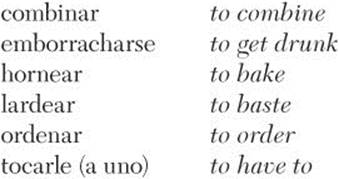
Nombres
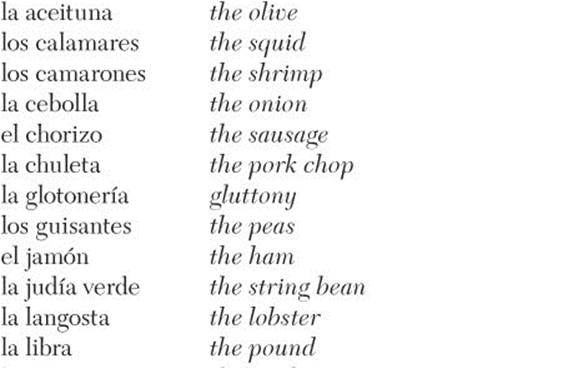
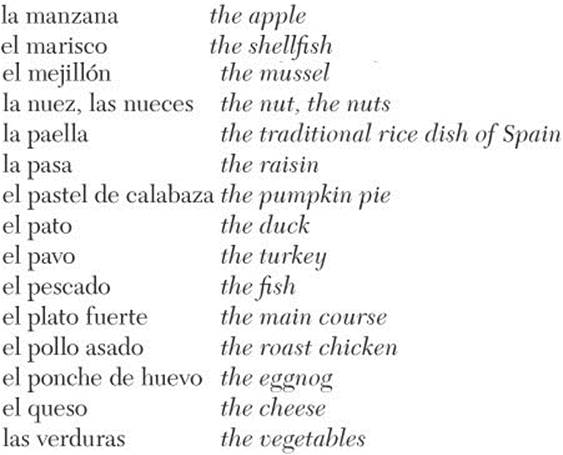
Adjetivo
![]()
Expresiones
![]()
Preguntas
Answer the following questions orally.
1. ¿Es hombre o mujer la persona principal del cuento?
2. ¿Están enfadadas con ella sus compañeras de cuarto?
3. ¿Te gusta celebrar el día de acción de gracias?
4. ¿Cuál es tu comida favorita?
5. ¿Te molesta comer solo/sola?
6. ¿Cocinas bien?